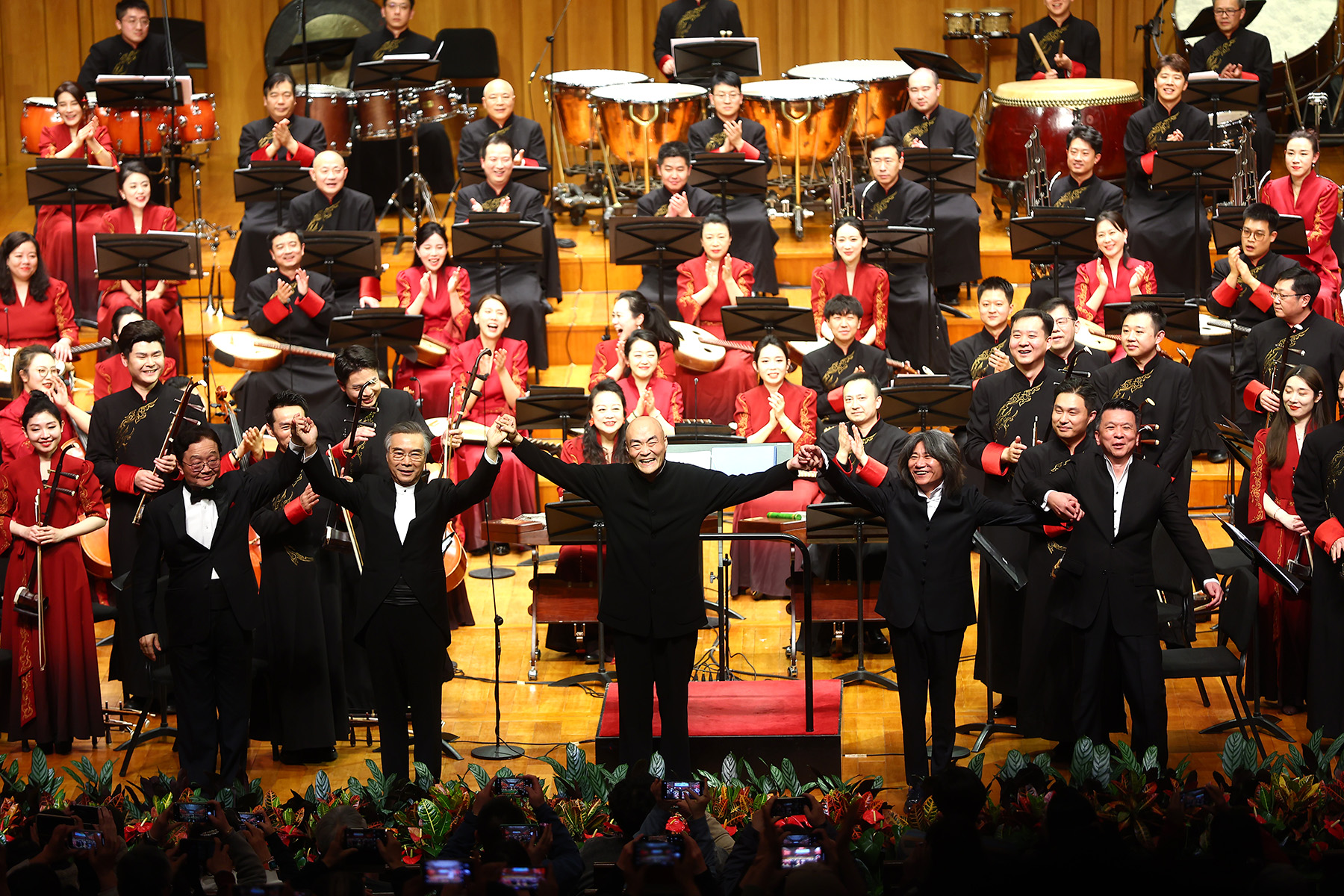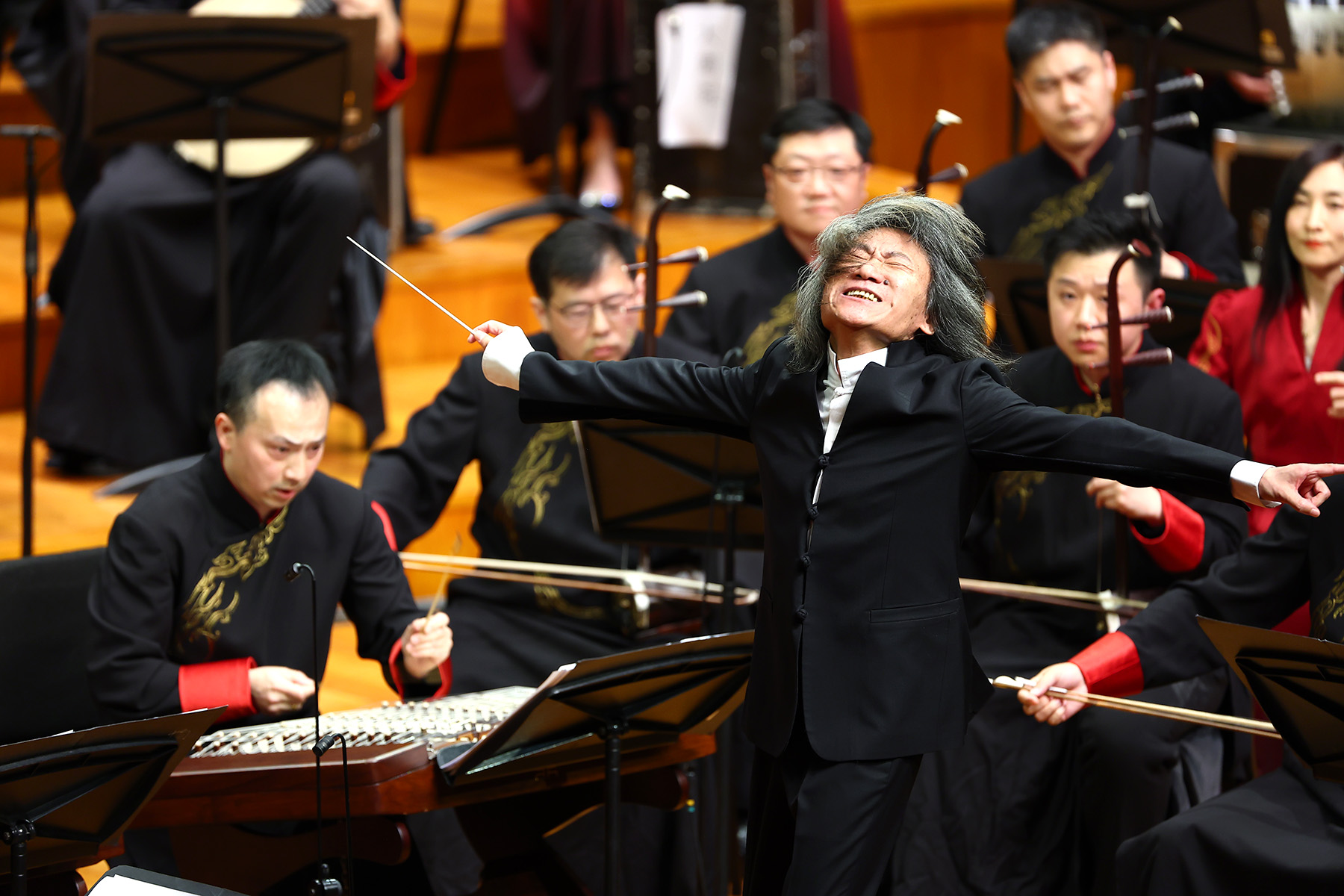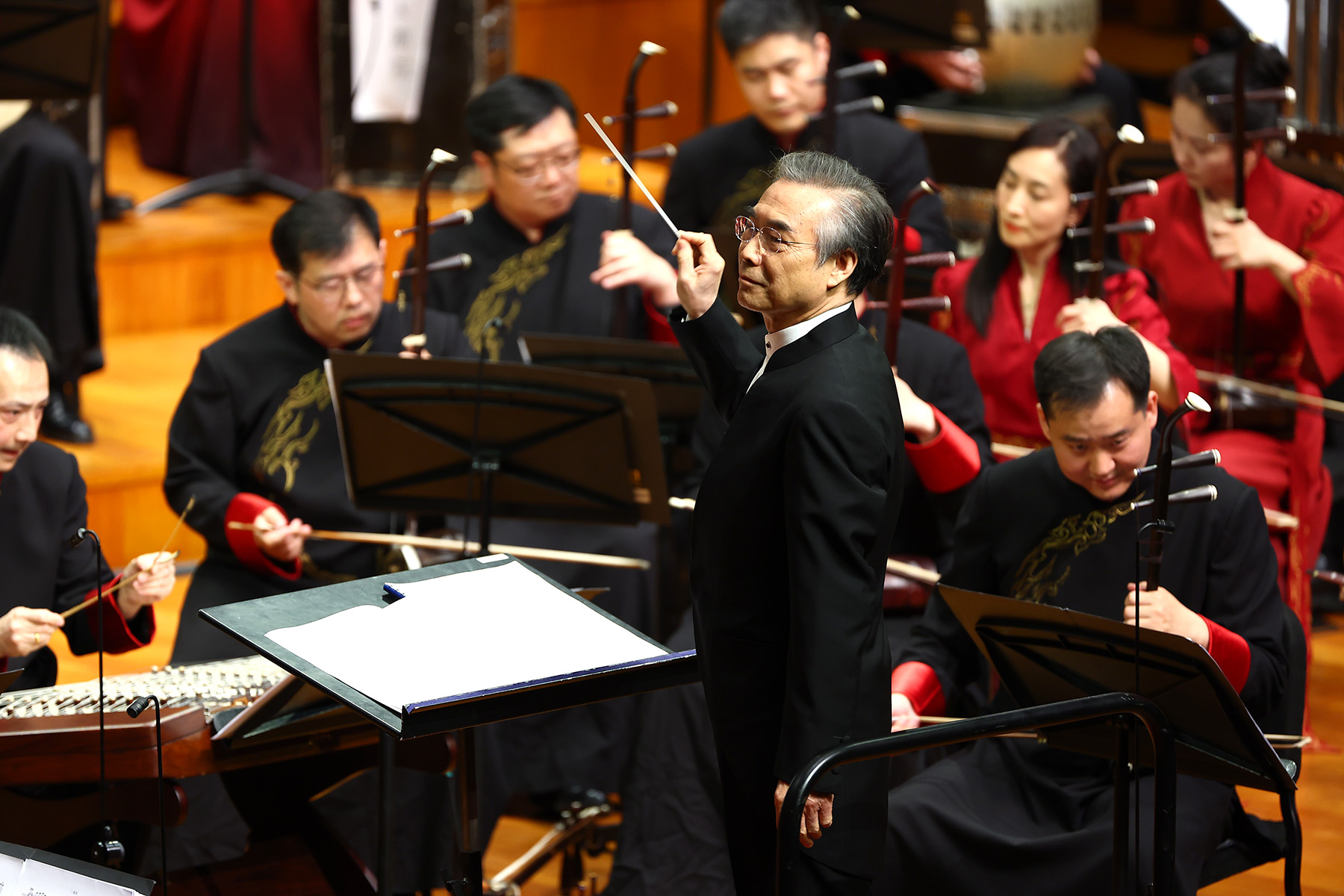Welcoming musicians and conductors from China and Singapore, the second Spring of Traditional Chinese Music festival kicks off in Beijing, Chen Nan reports.

Recognizing the rising popularity of traditional Chinese music, which has been winning over a growing number of fans, especially young people, in 2022, the China National Traditional Orchestra and the National Centre for the Performing Arts launched a festival titled Spring of Traditional Chinese Music.
Now, two years later, the second iteration of the festival has begun. The monthlong celebration of Chinese musical heritage runs from March 31 to April 27 and will feature 19 concerts performed by 15 orchestras from the Chinese mainland, the Hong Kong Special Administrative Region, Taiwan, as well as Singapore.
Traditional Chinese music is a great medium for introducing Chinese culture, using instruments with hundreds or thousands of years of history and pieces that are performed worldwide.
Tsung Yeh, conductor emeritus, Singapore Chinese Orchestra
"When we made plans for the opening concert for this year's Spring of Traditional Chinese Music, we had five conductors in mind. They represent the top level of traditional Chinese music, not only at home, but also abroad," says Zhao Cong, a veteran pipa (a four-stringed lute) player, who is also the president of the China National Traditional Orchestra. "We are very excited that they are all attending the festival.
"As a musician who has been playing the pipa ever since I was a child, I am so happy to see that traditional Chinese music has become popular among young people, with a greater number of people listening to, and learning, these old instruments," says Zhao.
The five conductors are Liu Sha, who is the principal conductor of the China National Traditional Orchestra, Liu Chiang-pin, artistic director and conductor of the Hsinchu City Youth Chinese Orchestra, Pang Kapang, who is the chief conductor and artistic director of the Suzhou Chinese Orchestra, Yan Huichang, the artistic director and principal conductor of the Hong Kong Chinese Orchestra, and Tsung Yeh, who is the conductor emeritus of the Singapore Chinese Orchestra.
During the opening concert at the NCPA, they shared the stage by conducting the China National Traditional Orchestra, with each of the conductors choosing a program of pieces lasting about 20 minutes.
"It was magical to have the orchestra perform under the batons of the five conductors, who each has a different style and interpretation of the music. It felt like listening to five different orchestras over the course of one night," says Zhao.

According to Wang Luli, deputy director of the program management department at the NCPA, the concerts during the festival bring established and young musicians together, to play classic pieces that display the essence of traditional Chinese music, and also play contemporary pieces to show the creativity of ancient Chinese instruments. A varied format, alternating from solos and duets, to ensemble performances, makes the festival a great chance for people to enjoy and rediscover the beauty of traditional Chinese music.
"For me, performing during this event in Beijing is like coming home," says conductor Yan, 70, who served as the principal conductor and artistic director of the China National Traditional Orchestra before he joined the Hong Kong Chinese Orchestra in 1997. "Traditional Chinese music is well-preserved and is performed widely by Chinese orchestras located around the world, which sends a message about the lasting impact and popularity of traditional Chinese instruments. I am very proud of it."
On April 20, Yan will lead the Beijing Chinese Orchestra in a concert, featuring pieces on the theme of the four seasons. Since the concert will take place a day after Grain Rain — the sixth of the 24 solar terms — which marks the end of spring, pieces will include Ode to Spring and Moonlit River in Spring.
At the concert on March 31, Yan performed Happy Gathering, an excerpt from his original suite, Hainan Fengqing (The Charm of Hainan), with the China National Traditional Orchestra. He says that he composed Hainan Fengqing during a trip to the island province in southern China, where he was inspired by local folk music and dances.
"Since Hainan Fengqing has not yet been performed, it was a premiere for Happy Gathering, which I am honored to present in Beijing," adds Yan.

"Traditional Chinese music is a great medium for introducing Chinese culture, using instruments with hundreds or thousands of years of history and pieces that are performed worldwide," says maestro Yeh, 74, who led the Singapore Chinese Orchestra on its debut at the NCPA on April 5. Founded in 1997, the Singapore Chinese Orchestra is the country's only full-time professional Chinese orchestra. The Shanghai-born conductor took the reins of the orchestra in 2002 and in January 2023, was named conductor emeritus.
In 2022, conductors Lyu Jia and Li Xincao, who lead Chinese symphony orchestras and perform Western classical music, were invited to perform with traditional Chinese music performers. Their different approach to music provided audiences with a fresh perspective on traditional Chinese music.
On April 25, conductor Tan Lihua and the Beijing Symphony Orchestra will interpret traditional Chinese music pieces, merging the styles of the East and the West. Pipa player Wu Yuxia, guzheng (a zither-like traditional stringed instrument) player Wang Zhongshan, bamboo flutist Zhang Weiliang and erhu (a two-stringed, bowed instrument) player Song Fei will take part in the concert, playing well-known pieces such as Dream of Flying in the Sky and Moonlight Reflected on the Erquan Spring.
Zhao says that in 2022, a concert gathering a number of top Chinese pipa players to showcase the 2,000-year-old instrument ended the first Spring of Traditional Chinese Music.
This year, the guqin (a traditional seven-stringed zither), which was added to the Representative List of the Intangible Cultural Heritage of Humanity by UNESCO in 2008, will be highlighted during the closing concert.
On April 27, about 20 eminent guqin players, including Wu Na, Chen Leiji and Ding Chengyun, will gather to perform with the China National Traditional Orchestra and soloists of other instruments, such as xiao (a vertical bamboo flute) player Wang Jianxin and hand drummer Li Congnong.
Contact the writer at chennan@chinadaily.com.cn


